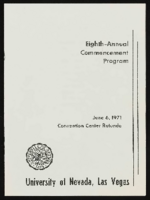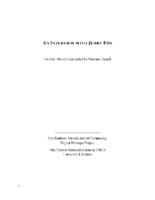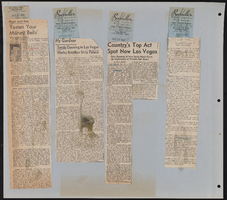Search the Special Collections and Archives Portal
Search Results

University of Nevada, Las Vegas (UNLV) 8th commencement program
Date
Archival Collection
Description
Commencement program from University of Nevada, Las Vegas Commencement Programs and Graduation Lists (UA-00115).
Text
Del Webb Corporation Photograph Collection
Identifier
Abstract
The Del Webb Corporation Photograph Collection (approximately 1957 to 1988) consists of black-and-white photographic prints, black-and-white oversize reprints, negatives, and color slides focusing on the Mint Hotel and Casino in downtown Las Vegas, Nevada. Images depict the construction of a twenty-six story high-rise addition to the property, its grand opening and anniversary celebrations, the Mint 400 Off-Road race festivities, interior shots of the casino floor, restaurants and lounges, and a salon. Also included are exterior images of properties on Fremont Street considered to be competitors of the Mint, advertisements and billboards, and photographs of Del E. Webb and associates.
Archival Collection
Bob Stupak Professional Papers
Identifier
Abstract
The Bob Stupak Professional Papers (approximately 1900 to 2007) primarily documents the career of Las Vegas, Nevada casino owner, Bob Stupak. The materials in the collection include the planning of two resorts in Las Vegas, Nevada created by Bob Stupak: Vegas World and the Stratosphere. The collection also includes planning materials for the Titanic Las Vegas, an unbuilt resort envisioned by Stupak. Planning and promotional materials for Stupak's resorts including photographs, memorabilia, audiovisual materials, advertising mockups, and architectural drawings. The collection includes several scrapbooks and photographs of Stupak and his wife Sandy at events around Las Vegas. The materials also document Stupak's political campaigns running for mayor of Las Vegas in 1983 and 1987 and lieutenant governor of Nevada in 2006.
Archival Collection

Carl Esteban oral history interview: transcript
Date
Archival Collection
Description
Oral history interview with Carl Esteban conducted by William Bailey on December 2, 2022 for the Reflections: the Las Vegas Asian American and Pacific Islander Oral History Project. In this interview, Esteban recalls growing up in Salinas, California in a predominantly Asian community before relocating with family to Las Vegas, Nevada in 2002. As a first generation Filipino America, Esteban's mother sacrificed her life in the Philippines to become the sole person in her family to immigrate to America. Esteban received his degree in Special Education and is currently pursuing to a master's degree in the same field. Esteban is currently a special education educator at the Yvonne Atkinson-Gates Center in North Las Vegas. Throughout the interview, Esteban discusses a wide range of topics spanning from his family migration story, his early childhood, his Filipino identity, Asian stereotypes as the model minority, and how his mentors helped shape him into the person he is today.
Text

Transcript of interview with Jerry Fox by Barbara Tabach, November 12, 2014
Date
Archival Collection
Description
Interview with Jerry Fox by Barbara Tabach on November 12, 2014. In this interview, Fox discusses his father's restaurant, Foxy's Delicatessen, which opened on the Las Vegas Strip in the 1950s, and his own business endeavors including the Tinder Box and an embroidery business.
Jerry Fox grew up in Los Angeles until his family moved to Las Vegas in February 1955, where his father opened Foxy's Delicatessen, the city's first Jewish deli. Jerry would go on to follow in his father's entrepreneurial footsteps, operating several ventures across different industries, including his own restaurant, Foxy Dog. Jerry sold Foxy Dog in 1975 after going through a divorce, the same year that Foxy's Deli closed.
Text

Transcript of interview with Lucille Down by James Hanson, February 21, 1972
Date
Archival Collection
Description
On February 21, 1972, James Hanson interviewed Mrs. Lucille Down (born December 14th, 1911 in Wellington, Kansas) in her home in Las Vegas, Nevada. The interview covers the lives of Union Pacific Railroad workers, and local education at schools such as the Las Vegas Grammar School and Las Vegas High School. Lucille discusses her first job, which was at the Southern Nevada Telephone Company. She also mentions having a swamp cooler attached to her family home. She concludes this interview with recollections on the social, recreational, religious and economic, changes that contributed to the development and growth of Las Vegas, Nevada.
Text
Elaine Newton oral history interview
Identifier
Abstract
Oral history interview with Elaine Newton conducted by Cecilia Winchell, Kristel Peralta, and Vanessa Concepcion on May 19, 2021 for Reflections: The Las Vegas Asian American and Pacific Islander Oral History Project.
Elaine Newton shares her family's history living in Hawaii and Japan, and memories from her childhood growing up with her six siblings in Honolulu. She talks about becoming a flight attendant for Pan American World Airways and how she met her former husband, Wayne Newton, after a stop in Vietnam. Elaine recalls their courtship and marriage as well as what Las Vegas life, fashion, and entertainment were like during the 1980s. She also speaks about racial discrimination and anti-asian violence in the past and present.
Archival Collection

Meeting minutes for Consolidated Student Senate, University of Nevada, Las Vegas, March 03, 2003
Date
Archival Collection
Description
Text


